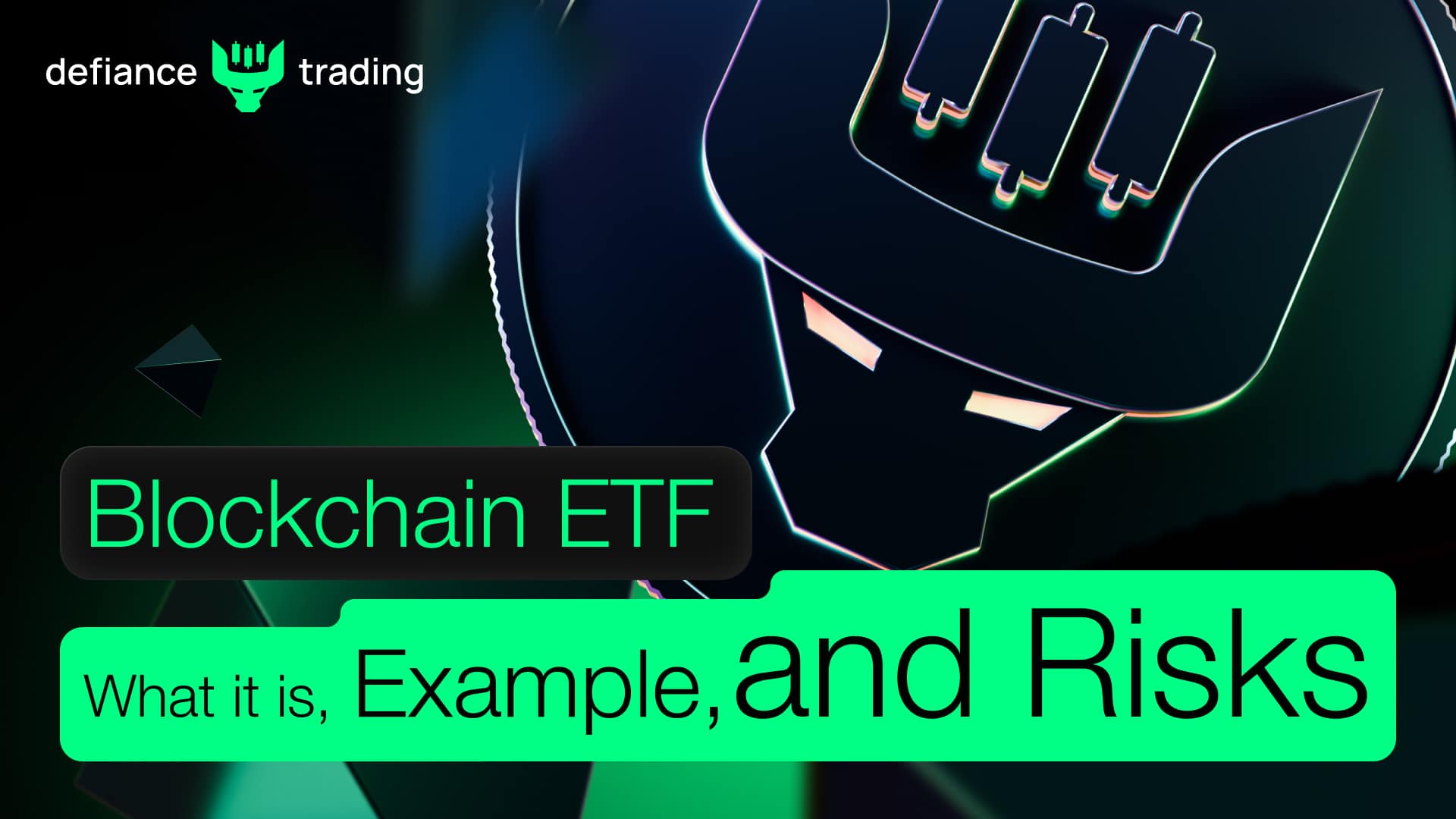Blockchain ETF: What it is, Examples and Risks

The global growth of blockchain has prompted its adoption across industries. The blockchain market globally has grown exponentially. It will rise from $28.93 billion in 2024 to $49.18 billion in 2025. This figure is expected to reach $88.2 Billion by the year 2030. Thus, investors are looking for ways to tap into this gold mine, and one way to do that is through blockchain ETF (Exchange-Traded Fund).
Blockchain technology is popular for keeping decentralized records of cryptocurrency transactions. However, it has other useful applications in several industries, which contribute to the expansion of the blockchain market. Blockchain ETF has grown with this expanding blockchain market. As such, it gives investors the opportunity to invest in a diverse set of companies that use blockchain technology in their business. In the US alone, twenty-five ETFs provide investors access to companies utilizing blockchain.
Understanding blockchain ETFs is necessary to fully maximize their potential. Therefore, in this article, we will discover in detail what a blockchain ETF is and explore the various risks that accompany it.
Here we go!
What is a Blockchain ETF?
Blockchain ETFs are investment funds that track the performance of companies involved in business activities related to blockchain technology. They allow investors to make a profit from blockchain technology without having to invest in individual blockchain companies. Basically, they display a diversified portfolio of companies with blockchain-related assets, like Nvidia and IBM, providing investors with a wide range of investment opportunities.
Blockchain ETFs are a type of exchange-traded products (ETPs), and the performance of the underlying companies affects its performance. In addition, investors can trade these blockchain ETFs on major stock exchanges, just like individual stocks. Blockchain ETFs just make it easy to buy and sell blockchain-related stocks.
How does Blockchain ETF work?
Blockchain ETFs work by tracking the performance of the blockchain-related assets of companies or industries. The performance of these assets directly affects how well the blockchain ETF performs. A particular ETF can track the performance of companies that provide a specific blockchain-related service or product. For example, an ETF can track companies involved in the development and implementation of blockchain technology while another may be for companies providing healthcare services with blockchain technology.
With the record of these companies’ portfolios, investors can make the necessary assessments before purchasing a stock. They also give investors a diversified range of assets to invest in.
Examples of Blockchain ETFs
Amplify Transformational Data Sharing ETF (BLOK)
It is the largest blockchain ETF by net asset with a total asset of approximately $822 million. It invests in companies involved in the development and utilization of blockchain technology. It targets to provide a total return by investing at least 80% of its net assets in the equity securities of these companies.
Siren Nasdaq NexGen Economy ETF (BLCN)
BLCN ETF tracks the performance of the NASDAQ Blockchain Economy Index, the “index”. It has a moderate net asset value and a total asset value of approximately $65 million.
First Trust Indxx Innovative Transaction & Process ETF (LEGR)
This ETF tracks the performance of exchange-listed companies worldwide that have given or have resources that use blockchain resources. This includes companies that are actively using, developing, or investing in blockchain technology. They have a total asset value of approximately $89 million.
Bitwise Crypto Industry Innovators ETF (BITQ)
BITQ focuses on companies that service the cryptocurrency markets. This includes crypto mining firms, crypto mining equipment suppliers, crypto financial services companies, or any financial companies servicing the crypto ecosystem. They normally invest 80% of their net assets in securities of crypto innovators and have a total asset of about $182 million.
Global X Blockchain ETF (BKCH)
BKCH ETF tracks companies that position themselves to benefit from the increased adoption of blockchain technology. It has a total net asset of approximately $200 million.
It is important to note that the total net assets of these ETFs are not fixed. They are subject to the changes in the performance of the companies that they track.
Risks of Blockchain ETF
Although it offers investors a more convenient way to invest in blockchain-related companies, it has inherent risks that investors must watch out for. Here are the risks of blockchain ETFs.
- The blockchain industry is fairly new and still very volatile. This volatility can be seen in the constantly fluctuating prices of blockchain-related assets. As such, if the price of an asset declines rapidly, so will the blockchain ETF which will further lead to significant losses.
- Also, there are security risks that blockchain technology is vulnerable to. Security risks, such as hacking, can greatly affect the performance of a blockchain ETF leading to a decline in the stock price and losses for the investors.
- Furthermore, there may be a lack of demand for a particular ETF or the underlying assets. This can occur if the assets or ETF are illiquid, leading to significant losses. Liquidity risks are fairly common, especially in unpredictable market conditions where many investors sell their shares quickly at a suboptimal price.
- Regulations guiding the blockchain market to prevent malpractices are still not clear. Due to this, blockchain-related investments are always in murky waters and there is always uncertainty and risk for investors.
- Lastly, the ETF market can be easily manipulated by a group of investors, especially because of the wide regulatory gap in the industry. For example, if a small group of investors decide to manipulate the market by pulling out their stocks, it can negatively affect the performance of the ETF.
Conclusion
Blockchain-based investments have proven, over the years, to be effective in building wealth. Fortunately, blockchain ETFs offer a convenient way to invest in blockchain. However, with blockchain ETFs, the risks are important considerations. Through constant evaluation of the ETFs and risk management techniques, investors can capitalize on ETFs, and make a profit from their shares.
For more information and blockchain guides, visit our WEBSITE today!
Ready to Defy the Odds?
Become part of a growing movement
